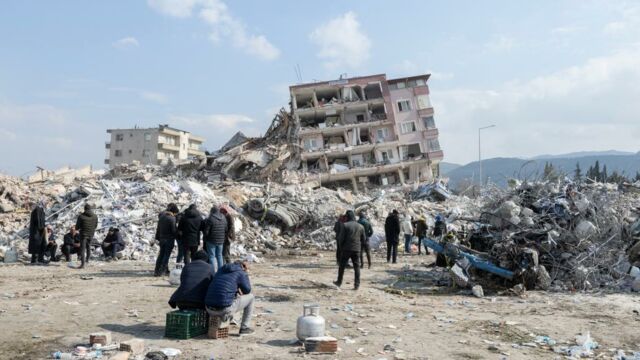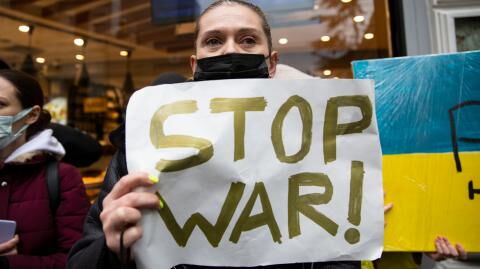The death toll continues to rise after last week’s magnitude 7.8 earthquake ravaged Turkey and Syria. The combined official number of deaths is currently at 36,000 and is likely to increase.
Discover our latest podcast
It is now one week since tragedy struck and rescuers are still frantically searching through the rubble as the hopes of finding survivors is quickly fading. As the rescue phase draws to an end, we look at the various ways you can help victims and their families in the way of aid and donations, as per Reuters.
How to donate
If you want to help with this humanitarian crisis it’s important to give to established charities and organisations so that your donations are actually going to the people in need. Regulators across in the UK and US are urging the public to 'give safely' when looking to support international aid efforts in response to the earthquakes
Gerald Oppenheim, Chief Executive of the Fundraising Regulator in the UK said, as per Gov.uk:
The British public are generous and will be eager to support the relief work led by the DEC and its member charities where they can. Please carry out our recommended checks before donating money or goods to make sure you are giving to a genuine cause and that your generously donated money reaches its intended destination.
UK aid agencies like the British Red Cross, Oxfam and ActionAid are all joining together to raise money. The Disasters Emergency Committee (DEC) brings together 15 leading UK aid charities, raising funds to quickly and effectively respond to overseas disasters. Other charities are available but the regulator encourages people to follow these steps to verify them before giving:
- Check the charity’s name and registration number on the Charity Register at www.gov.uk/checkcharity – most charities with an annual income of £5,000 or more must be registered.
- Make sure the charity is genuine before giving any financial information.
- Be careful when responding to emails or clicking on links within them.
- Contact or find out more online about the charity that you’re seeking to donate to or work with to understand how they are spending their funds.
- Look out for the Fundraising Badge – the logo that says ‘registered with Fundraising Regulator’ – and check the Fundraising Regulator’s Directory of organisations which have committed to fundraise in line with the Code of Fundraising Practice.
In the US, you can use Charity Navigator, which provides lists of verified charitable organizations and ratings for each one. Some of the highest-rated US-based charities for the Turkey and Syria earthquake relief efforts include, as per Forbes:
- Syrian American Medical Society Foundatio
- Center for Disaster Philanthropy
- Plan International Inc.
- Direct Relief
Read more:
⋙ From worker to teacher strikes, here's everything you can expect in the week of 13 February
⋙ War in Ukraine: Here's how you can help in the ongoing crisis
Devastating earthquakes have hit Turkey and Syria, killing and injuring thousands of people.
— DEC (@decappeal) February 9, 2023
Survivors urgently need rescue, medical aid, shelter, blankets and food.
Today the DEC is launching the #TurkeySyriaAppeal.
Donate now to help save lives: https://t.co/267b15rrEnpic.twitter.com/vTEFFwy2d9
Read more:WHO issues alert over possible new pandemic that could affect humans, should we be worried?
What to donate and when
The relief effort goes through various phases as the situation changes but experts generally recommend that donating cash is the best option. Donating things like water, canned food and clothes can be helpful but money is the most effective thing a charity can have to meet the demands of the emergency.
Chris Hufstader, a writer at Oxford Committee for Famine Relief, comments as per Forbes:
As long as there are functioning markets that can supply people with food and other goods they need, delivering cash to people in an emergency (instead of food, for example) helps circulate money through the local economy, supports local businesses, and can help communities recover faster.
That being said, several Turkish consulates in the US are collecting donations for various supplies like blankets, tents, pocket warmers, sleeping bags, over-the-counter medications and winter clothing.
The situation in Turkey and Syria needs immediate assistance but will also need further help as time moves on and they try to rebuild homes and infrastructure in their respectives countries and so people are encouraged to keep donating.
Humanitarian organisations across the globe are doing everything they can to deliver aid but are struggling with the damaged infrastructure, roads and airports. The earthquake in Turkey is the deadliest since 1939 with 31,643 people confirmed dead so far. Meanwhile, Syria has more than 4,300 people reported dead. Relief efforts are severely restricted given that the country has suffered a decade of civil war and has only a single crossing open on the Turkey-Syria border for U.N. aid supplies.
Sources used:
- Reuters 'Rescuers in Turkey dig to rescue family a week after earthquake'
- Forbes 'Earthquake Relief: Here’s How To Donate To Turkey And Syria'
- The Guardian 'Turkey and Syria earthquake: where to donate in the US to help victims'
- Gov.uk 'Regulators urge safe giving to support Turkey-Syria earthquake relief effort'















